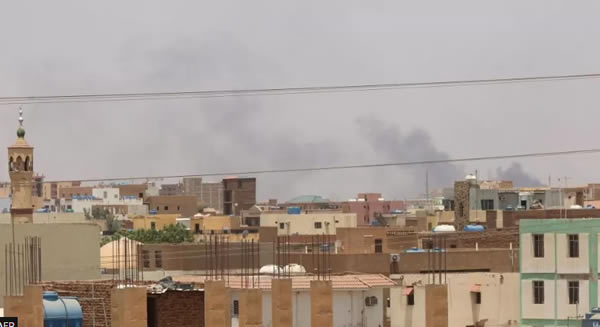
A catastrophic food crisis looms in Sudan if fighting doesn’t stop, said Freydoun Borhani, team leader with aid organization Mercy Corps in Gedaref state, on the Ethiopian border.
“Right now, it’s planting season in Gedaref state, for example. People there must buy seeds for plantation. The price of the seeds go very high. And this creates a problem for the farmer,” Borhani said.
But that’s not the only challenge farmers face, according to Borhani.
“Besides that, the number of people who moved here have created a lack of food in the market, and the price of food is very high, and some people cannot afford to purchase this food,” Borhani said. “Some places, it’s 134 percent increase. Wheat flour, rice or sugar also 100 percent or more.”
Mercy Corps had plans to distribute seeds to about 2,100 farmers in Gedaref, Nyala and Kordofan states, but for security reasons it will be able to give seeds to only 700 farmers in Gedaref starting next week.
The latest 24-hour cease-fire negotiated by the United States and Saudi Arabia expired early Sunday, and the war is showing no signs of ending, as fighting continues in parts of the capital, Khartoum, and elsewhere.
Kenya’s President William Ruto said he and other East African leaders plan to meet the Sudanese generals in person next week to discuss ways to end the war. The announcement follows a gathering of heads of states and government convened by the East African bloc IGAD, or Intergovernmental Authority on Development, in Djibouti earlier this week.
“We have taken the decision that the quartet of Kenya, Ethiopia, South Sudan and Somalia will in the next 10 days meet face to face with General [Abdel Fattah al-] Burhan and General [Mohamed Hamdan] Dagalo in a face-to-face engagement, so we can speak to them directly on behalf of IGAD with a view of stopping the war that is raging in Sudan,” Ruto said following the IGAD talks.
Macharia Munene, professor of history and international relations at the United States International University in Nairobi, told VOA the in-person meeting with the two generals is a good step but there are more factors at play.
“The problem with IGAD and AU [African Union] is that it depends on the EU [European Union] and external forces of resources to operate,” Munene said. “That’s the main problem … sometimes it’s difficult to agree on anything, in part because the players are dependent on advice and resources from outside.”
Abdisalan Adan, education and peace advocate and the director of Maarifa College in Kenya, told VOA bringing them to the table might be the solution, but there’s much to accomplish between now and then.
“First of all, bridging the gap and bringing the trust among the two [generals] and from our side, Kenya, we should see the conflict from a wider perspective, then working very softly in terms of bringing all actors together, international actors together, not only IGAD, but bring on board African Union, European Union and Americans,” he said.
Dr. Edgar Githua, a lecturer at USIU and Strathmore University specializing in international relations, peace and conflict, told VOA that Kenya’s Ruto is a good person to lead the negotiations.
“I think he’s seen conflict within Kenya. Remember, in Kenya we had our post-election violence in 2007, and he was part of that mediating team … so he understands what internal conflicts are all about; in Sudan, it’s an internal conflict, so he understands the dynamics,” Githua said.
Ruto also said officials will try to persuade the warring factions to establish a humanitarian corridor in the next two weeks and, following that, initiate a process of an inclusive national dialogue.
But in a statement on Thursday, Sudan’s foreign ministry said it preferred South Sudanese leadership of the initiative.
Since the war started about two months ago, more than 1.65 million people have been displaced, including more than 1.2 million within the country and about half a million to neighboring countries. As long as the conflict continues, Mercy Corps says humanitarian needs will grow among the populations that were already severely food insecure.
Source: voanews.com























